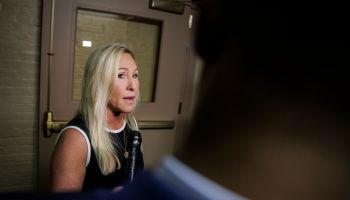Can love be as addictive as food, drugs or alcohol? Does it seem like you cannot get out of your own way when it comes to love? Author, Rachel Resnick, thinks you may be a love junkie because she definitely was one.
SOURCE: AOL
Think you’re simply unlucky when it comes to finding love? Not so fast. Rachel Resnick, author of the new memoir “Love Junkie,” reveals how a series of toxic relationships she’d once chalked up to misfortune turned out to be a dangerous addiction. Resnick likens her habit to that of a drug abuser: Every bit as powerful in its ability to destroy, and rooted in a tumultuous past — her mother was an alcoholic who eventually committed suicide, and her father once took out a want ad in a local paper and asked strangers to take her in. Resnick’s tell-all tale isn’t just voyeurism; it’s a sobering raw account that gives readers — whether or not we identify as junkies — proof that a commitment to recovery can indeed restore hope.
AOLHealth: What, exactly, is a “love junkie”?
Rachel Resnick: A love junkie confuses sex for love, intensity for intimacy and drama for passion. A love junkie is someone who has to be in love. Another hallmark of being a love junkie is a pattern of destructive relationships — not just one or two, but a pattern. One way I would describe a destructive relationship is one that has an ill effect on your health, your financial state, your job or your state of mind.
AOL Health: Is love addiction as serious as, say, heroin addiction?
RR: Both can ruin your life and the lives of others. For example, I once was so obsessed with reaching a lover with whom I was fighting that I called repeatedly on my cell, got distracted and smashed into the rear end of a family van in the middle of the Hollywood freeway. Luckily, the traffic was thick, and we were going slowly enough that no one got hurt. This was one wake-up call for me.
AOL Health: How did you first realize you were a love junkie?
RR: I’m 46, and it took me decades to realize it. I’ve been a love junkie since I was a kid. But even as an adult, I never thought I was a love junkie. That’s one of the reasons I wanted to write this memoir. I wish I’d read a book like this when I was younger. I had no idea that you could be addicted to love, sex, romance or relationships. For years, I literally thought I was just extra passionate and unlucky in love!
The book opens with a scene of me hitting bottom when I was 41: It’s the night before Valentine’s Day. I come home from teaching, and my home has been vandalized by my ex-boyfriend. My computer has been destroyed. That was a wake-up call, the lowest point after having chosen a man who would do that. And I chose him because I was desperate.
I called a friend and told her this happened. I said, “Maybe there’s something wrong with me.” She was supposed to say, “There’s nothing wrong with you, you’re perfect, it’s him who’s wrong.” Instead she said, “Maybe there is something wrong with you.” That time, I heard it. For the first time, I actually considered that there might be something wrong with me. I’d always thought it was the men. I felt like the victim.
So I went to a 12-step meeting for people who are addicted to love, sex and romance. I didn’t want to go. But as soon as I walked in and heard people talking, I felt at home. I heard the stories of men who had sex addictions that caused them to lose their jobs and families; women who were fantasy addicts and spent all their energy obsessing about people they weren’t even involved with them; and then were others who, like me, just kept having destructive relationship. I knew I belonged there. I realized that I was an addict, and it was a shock.
Love addiction is tricky to nail down because it looks different for each person. There are substance addictions that we’re all familiar with. But then there are process addictions — addictions to love, sex, money, work — that involve tasks we need to do every day and that are just part of our lives. People aren’t as alert to or knowledgeable about process addictions, so they can harm themselves and not live as fully as they could. Both substance and process addictions are often rooted in the same kind of problem: Trauma in childhood.

















